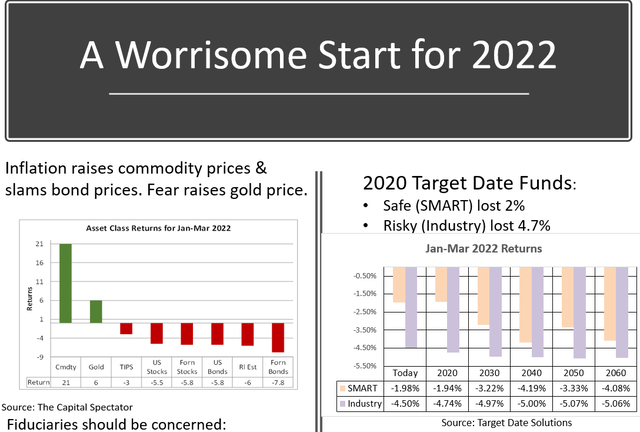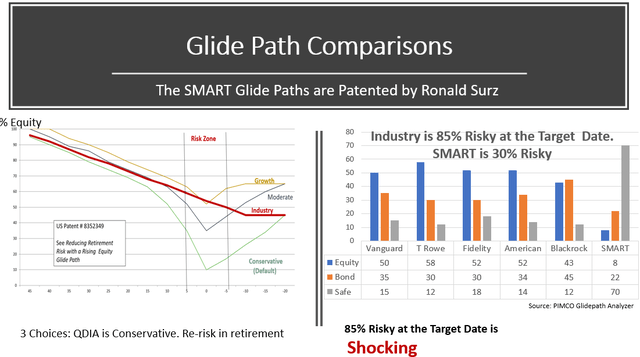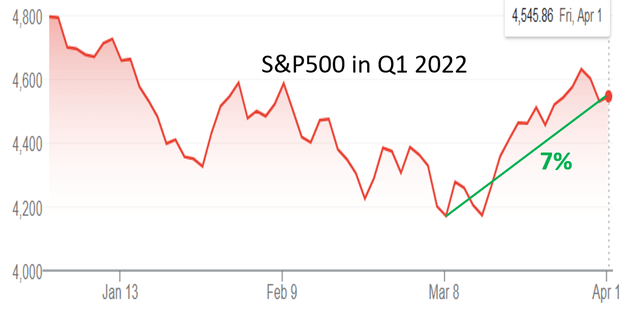ThomasVogel/E+ via Getty Images
The effects of inflation are beginning to impact bond prices. Bond yields are going up, so bond prices are going down. I’ve written in the past that yields could reach 10%, which would cause bond prices to halve. Others say that the Fed will end tapering just as it did in the 2013 “Taper Tantrum” when increasing bond yields triggered stock losses. It will be interesting to see what happens this time since the Fed cannot continue ZIRP (Zero interest rate policy) and control inflation because ZIRP requires money printing.
Here’s what’s happened so far since the Fed began fighting inflation.
Capital Spectator & Target Date Solutions
Time to Worry
Fiduciaries should be concerned about their choice of target date fund (TDF). There are safe TDFs that have defended in the first quarter as well as 2008, but most fiduciaries have chosen the Risky brand as shown in the following.
What just happened could be the beginning of more to come. After all, the stock market is more than 7 years overdue for a correction since corrections happen about every 5 years. But perhaps not, since the stock market has recently gone up 7% and did so as the war in Ukraine raged on.
Greed has turned to fear, so stock prices are up
Nothing has stopped the US stock market’s meteoric rise over the past 13 years – not even a pandemic and not even a war during a pandemic. The S&P 500 gained 7% in March while the world agonized over Russia’s invasion of Ukraine and the possibilities of World War III bringing a nuclear holocaust.
Until now I’ve been attributing this unstoppable stock market rise to investor behavior and have documented the behavioral biases involved. But now I’m thinking it’s what I’ll call the “Venezuela syndrome.” In Harbingers from Venezuela, Japan and China I report that as Venezuela suffered hyperinflation “the Venezuelan stock market performed best in the world in 2016, earning 114% versus 13% on the Dow. This event has direct application to the recent US stock market. According to this Marion West article:
“The curious case of the Venezuelan public equities market is a prime example of why it can be misleading to use stock markets as indicators of economic performance. Most economists agree that Venezuela’s economy is in turmoil, and that there is no end in sight. The real reason behind the market’s astronomical rise has little to do with ebullient investor sentiment, but instead is one of the symptoms of the government’s inflationary monetary policy. In short, owners of the country’s currency protected themselves from the currency’s severe devaluation by exchanging their bolivars for seemingly safer assets, including stocks. With huge volumes of money pouring in, the stock market artificially inflated.”
In other words, it’s conceivable that inflation fears are currently fueling the stock market fire. Investors may have pivoted from greed to fear. But this belief that stocks will protect against inflation is just plain wrong. Inflation will pop the stock market bubble, as I explain in the following.
Stocks are not an inflation hedge, not this time
The common wisdom is that stocks defend against inflation because they can pass along price increases to their customers, and that’s generally true, but rising interest rates hurt corporations in ways that are not easily passed on.
Inflation causes interest rates to increase. In this situation where interest rates have been manipulated near zero following the Fed’s Zero Interest Return Policy (ZIRP) the increases will be substantial. The Fed cannot control inflation and continue ZIRP because ZIRP requires massive money printing. I believe the Fed will abandon ZIRP and allow interest rates to increase.
In normal times, bonds yield 3% above inflation, so 10% in a 7% inflationary environment. This represents an 8% increase from the current 2% level that will cause a 48% decline in bond prices since bond duration is currently 6.
While bond prices get clobbered, stock prices will also fall because borrowing costs will increase, and investment professionals will use a higher discount rate to evaluate future earnings. A stock market correction is long overdue. Something needs to pop this bubble and it will likely be inflation.
Conclusion
We got a head fake in the first quarter of 2020 when the stock market declined, but then quickly recovered – “buy the dip” worked. But we all know that someday the dip will be deep and long lasting, and completely unaffordable for baby boomers who don’t have time on their side. That’s why I wrote Baby Boomer Investing in the Perilous Decade of the 2020s.
This group of 78 million people needs to protect their lifetime savings. Unfortunately, bonds won’t protect, so these folks need to move to inflation protection like TIPS, natural resources, commodities, precious metals, etc. It’s not pretty, but it’s the reality.




Be the first to comment